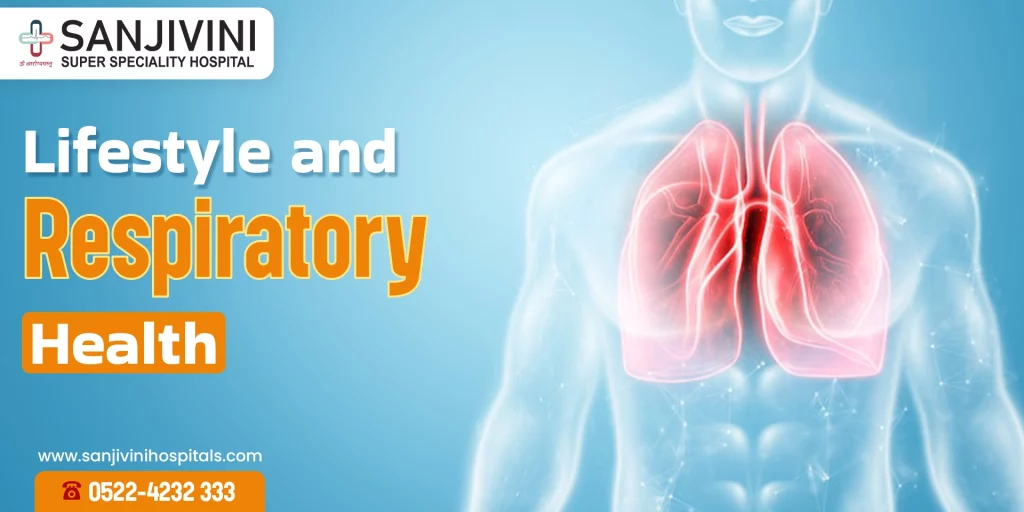Medically Reviewed by: Dr. Abhishek Gupta MBBS, MD-FIP EDARM
If you’ve ever wondered about the secrets to breathing easy and keeping your lungs happy and healthy then you’re in the right place.
We all know how important it is to take care of our bodies, but sometimes we forget just how crucial our respiratory system is. This blog is here to shed some light on Embracing a Healthy Lifestyle for Respiratory Wellness.
Understanding Respiratory Health
- Importance of the Respiratory System:
- Vital for oxygen and carbon dioxide exchange.
- Comprises airways, lungs, and breathing muscles.
- Common Respiratory Issues:
- Includes asthma, COPD, and respiratory infections.
- Asthma is characterized by inflammation, leading to symptoms like wheezing and shortness of breath.
- Triggers for Asthma Symptoms:
- Various factors, including respiratory infections like the cold, flu allergic pollution, etc.
- Impact of Respiratory Infections:
- Infections like flu, COVID-19, RSV, and colds can worsen asthma symptoms.
- Increased susceptibility to serious health problems in individuals with respiratory disorders.
- Prevention Measures for Respiratory Infections:
- Importance of flu and COVID-19 vaccinations.
- Emphasis on good hygiene practices.
- Adherence to an asthma action plan.
- Lifestyle Factors Affecting Respiratory Health:
- Smoking, air pollution, and occupational exposures play a significant role.
- Smoking is a major risk factor for COPD and other respiratory illnesses.
- Preserving Respiratory Health Through Lifestyle Choices:
- Embracing a healthy lifestyle.
- Avoiding tobacco smoke.
- Minimizing exposure to air pollutants.
- High Protein diet.
Also Read: 15 Tips to Manage Asthma During Winter Months
Elements of a Healthy Lifestyle for Respiratory Wellness
Nutrition and its Role:
- A balanced diet, rich in fruits and vegetables, is crucial for respiratory health.
- Essential components like vitamins, minerals, dietary fiber, and antioxidants in these foods support lung function and immune resilience.
- Studies suggest a “prudent” diet, with increased fruits and vegetables, may protect against chronic obstructive pulmonary disease (COPD).
- Antioxidants found in these foods play a vital role in shielding against the damaging effects of respiratory diseases.
Foods that Support Respiratory Health:
- Focus on incorporating fruits, vegetables, and fish into your diet.
- These foods are packed with antioxidants and nutrients beneficial for respiratory well-being.
- The Mediterranean diet emphasizes minimally processed plant foods and shows protective effects against allergic respiratory diseases.
Importance of Hydration:
- Proper hydration is essential for maintaining respiratory health.
- Adequate water intake keeps mucous membranes in the respiratory tract moist.
- Moisture is crucial for effective lung function and aids in clearing mucus and debris from the airways.
Regular Physical Activity:
- Engage in regular physical activity for respiratory wellness.
- Moderate-to-vigorous exercises, such as aerobic exercises, are recommended.
- Physical activity contributes to improved lung function and overall respiratory health.
Adequate Sleep and its Respiratory Benefits:
- Quality sleep is essential for overall well-being and respiratory health.
- During sleep, the body repairs and regenerates tissues, crucial for maintaining healthy lung function.
- Adequate sleep supports respiratory health by ensuring the body’s physiological processes are optimal.
Lifestyle Habits to Avoid
Smoking and Its Impact on the Respiratory System:
- Overview:
- Smoking is a highly harmful behavior for lung health.
- Associated with respiratory problems like COPD, lung cancer, and other diseases.
- Causes damage to airways and air sacs, leading to breathing difficulties and reduced lung function.
- Environmental Factors:
- Air Quality:
- Poor air quality, containing pollutants like smoke, dust, and chemicals, harms the respiratory system.
- Worsening existing conditions may lead to new respiratory problems.
- Essential to minimize exposure to maintain healthy lungs.
- Occupational Hazards:
- Certain workplaces, such as mining, construction, and manufacturing, pose respiratory risks.
- Exposure to dust, chemicals, and fumes can lead to respiratory problems.
- Employers and employees should implement measures to reduce on-the-job exposure and protect respiratory health.
- Air Quality:

Mind-Body Connection
- Stress Management and Respiratory Health:
- Regulating breath is crucial for managing stress and related conditions.
- Deep, slow breathing triggers the body’s relaxation response, reducing stress hormones.
- Offers effective relief from discomfort and pain.
- Breathing Techniques for Lung Strength:
- Diaphragmatic breathing enhances lung strength.
- Positively influences attention, negative feelings, and stress in healthy adults.
- Acts as a mind-body intervention to alleviate emotional challenges.
- Focusing on breath calms the mind, triggers the relaxation response, and may reduce chronic pain severity.
- Yoga and Meditation:
- Effective practices for stress management and improved respiratory health.
- Incorporate specialized breathing techniques.
- Therapeutic benefits in alleviating stress, anxiety, and chronic pain symptoms.
- Utilizing breath as a relaxation tool fosters a strong mind-body connection.
- Contributes to an overall sense of well-being.
Tips for a Respiratory-Friendly Home Environment
Creating a home that promotes respiratory health is easier than you might think. Here are some simple tips to consider:
A. Indoor Air Quality
- Enhance airflow by keeping interior doors open and using exhaust fans in bathrooms and kitchens.
- Steer clear of harsh products like bleach and opt for CERTIFIED asthma & allergy friendly® alternatives for bedding, vacuums, cleaning products, flooring, and paint.
- Establish regular cleaning routines to tackle dust, pollen, animal dander, and mold.
- Monitor humidity levels and maintain them below 50%.
- Close windows during peak pollen times and high outdoor pollution.
- Swap out strongly scented items like candles for battery-powered alternatives.
- If possible, replace carpets with solid surface flooring.
- Keep your HVAC system in check and change air filters regularly.
B. Proper Ventilation
- Focus on ventilation, heating, and cooling for fresh and balanced air.
- Dust furniture with a damp cloth instead of dry dusting.
- Opt for easy-to-clean vertical or roller blinds over curtains.
- Enclosed are open shelving units with doors.
- Regularly clean ceiling fans and air conditioning vents.
- Keep furniture clean by frequent vacuuming.
- Improve door and window seals with damp towels if they are leaky.
C. Allergen Control
- Declutter your space to reduce dust.
- Remove dust-collecting items like knickknacks, picture frames, and stuffed animals.
- Store dust-prone items in plastic bins.
- Wash bedding, curtains, and fabric items in hot water weekly.
- Restrict pets from bedrooms and upholstered furniture.
- Use allergen-proof covers on pillows, mattresses, and box springs.
- Vacuum carpets and rugs weekly with a HEPA-filter-equipped vacuum cleaner.
- Maintain indoor humidity between 30% and 50% with a dehumidifier.
By incorporating these straightforward tips into your routine, you can significantly enhance the air quality in your home, making it a more lung-friendly space.
Also Read: How Stress Affects Your Respiratory System?
Take a step towards Healthy Lifestyle for Respiratory Wellness! Consult with the highly skilled pulmonologist, Dr. S.N. Gupta, at Sanjivini Super-Speciality Hospital. Your journey to healthier lungs begins with expert guidance. Schedule your consultation now for personalized care and a breath of fresh air in your health journey.

